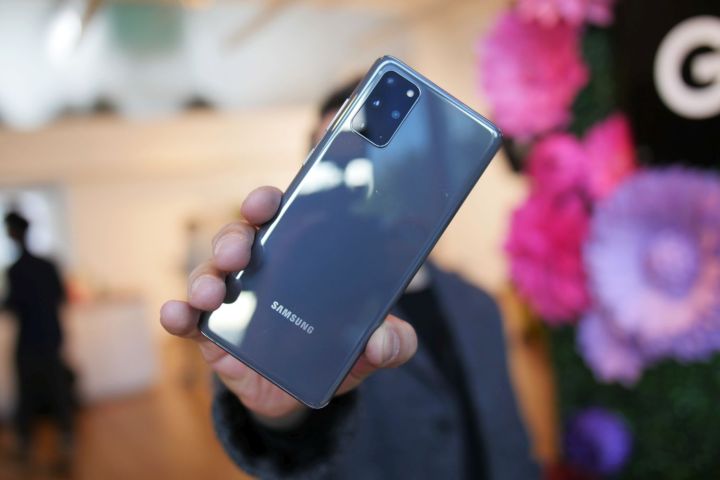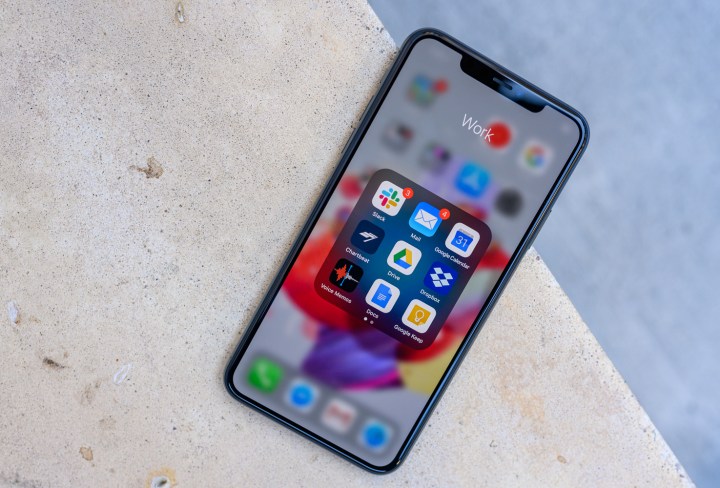Love a big phone? The Samsung Galaxy S20 Plus is still one of the biggest and best around, with a massive 6.7-inch Dynamic AMOLED display and an incredibly versatile quad-lens camera. It’s not the only big phone out there, though, and it seems everyone has one they prefer. For many, Apple’s iPhone 11 Pro Max was the best phone of its generation when it was released in 2019, with powerful flagship hardware, a long-lasting battery, and a jaw-droppingly good camera.
If you’re due for an upgrade or simply want something new and shiny, both of these massive, powerful flagships are tempting purchases. At over $1,000 for each, though, it’s unlikely you can buy both. Which is better for you? We found out.
Once you’ve settled on a device, take a look at the best Samsung Galaxy deals and the best iPhone sales available now.
Specs
| Samsung Galaxy S20 Plus | Apple iPhone 11 Pro Max | |
| Size | 161.9 x 73.7 x 7.8 mm (6.4 x 2.9 x 0.3 inches) | 158 x 77.8 x 8.1 mm (6.22 x 3.06 x 0.32 inches) |
| Weight | 186 grams (6.6 ounces) | 226 grams (7.97 ounces) |
| Screen size | 6.7-inch Dynamic AMOLED 2X | 6.5-inch Super Retina XDR OLED |
| Screen resolution | 3200 x 1440 pixels (525 pixels per inch) | 2688 x 1242 pixels (458 pixels per inch) |
| Operating system | Android 10 (under One UI 2.0) | iOS 13 |
| Storage space | 128, 512GB | 64, 256, 512GB |
| MicroSD card slot | Yes, up to 1TB | No |
| Tap-to-pay services | Samsung Pay, Google Pay | Apple Pay |
| Processor | Qualcomm Snapdragon 865 | Apple A13 Bionic chip |
| RAM | 12GB | 4GB |
| Camera | Quad lens 12-megapixel, 64MP telephoto lens, 12MP ultrawide lens, and ToF sensor rear, 10MP front | Triple lens 12MP wide, 12MP ultrawide, and 12MP telephoto rear; 12MP TrueDepth front |
| Video | 8K at 30 fps, 4K at 60 fps, 1080p at 240 fps, 720p at 960 fps | 4K at up to 60 fps, 1080p at 240 fps |
| Bluetooth version | Bluetooth 5.0 | Bluetooth 5.0 |
| Ports | USB-C | Lightning |
| Fingerprint sensor | Yes, in-display | No, Face ID instead |
| Water resistance | IP68 | IP68 |
| Battery | 4,500mAh
Fast charging (25W) Qi wireless charging |
3,969mAh
Fast charging (18W) Qi wireless charging |
| App marketplace | Google Play Store | Apple App Store |
| Network support | AT&T, T-Mobile, Sprint, Verizon | AT&T, T-Mobile, Sprint, Verizon |
| Colors | Cosmic Gray, Cloud Blue, Cosmic Black | Midnight Green, Space Grey, Silver, Gold |
| Price | $1,200 | $1,100 |
| Buy from | Samsung, AT&T | Best Buy |
| Review score | 4 out of 5 stars | 4.5 out of 5 stars |
Design, display, and durability
- 1. Samsung Galaxy S20 Plus
- 2. Apple iPhone 11 Pro Max
Looks aren’t everything, but when you’re spending so much, you want something you can show off. Thankfully, both of these phones are stunners. The Galaxy S20 Plus is probably the more unique of the two, with a sleek bezel-less design with curved edges and a single hole punch for the selfie camera. The iPhone 11 Pro Max is no ugly duckling, either, and while the notch is sizable, the bezel-less design is no less stunning.
The iPhone 11 Pro Max has a slightly smaller display, but it’s still huge. The 6.5-inch Super Retina XDR display runs a 2,688 x 1,242 pixel resolution, and it’s crisp with deep colors and inky blacks. The S20 Plus’ 6.7-inch Dynamic AMOLED 2X display has a sharper 3,200 x 1,440 pixel resolution, though you’ll be hard-pressed to tell the difference in real use. The S20 Plus’ display also has the option for a super-smooth 120Hz refresh rate, which will please gamers.
There’s a substantial difference in weight, though, and that’s down to build materials. The iPhone 11 Pro Max has a stainless steel frame, which is likely to be stronger than the S20 Plus’ aluminum frame. Durability differences end there, though, and both have an IP68 rating for dust and water resistance.
It’s very hard to separate these two, but based on the screen, the S20 Plus has to take the win.
Winner: Samsung Galaxy S20 Plus
Performance, battery life, and charging

There’s power a-plenty here, and both phones have great specs. The S20 Plus is rocking the Qualcomm Snapdragon 865 processor, while the iPhone uses Apple’s A13 Bionic processor. Benchmark scores between the two processors are split as to which is the more powerful, but what’s sure is you’re not going to lack power either way. Both phones will offer smooth performance in apps and games alike.
The S20 Plus has 3x more RAM than the iPhone, but this isn’t the slam dunk you’d expect, since iOS and Android handle RAM differently. There’s more of a difference with storage. Apple really needs to ditch 64GB as a storage option on the basic iPhone, as it just isn’t enough. The S20 Plus starts at 128GB and has support for 1TB MicroSD cards as well. The iPhone’s 256GB and 512GB models are better, but paying over $1,000 for 64GB of storage just isn’t acceptable.
Things are rosier for the iPhone where battery life is concerned. A full charge will take you into the next day and beyond, with our review unit hitting 35% at 5 a.m. after coming off the charger at 8 a.m. the day before. The S20 Plus has a sizeable 4,500mAh battery, and our review saw it last through days of heavy use without coming up short. It’s safe to say neither of these big phones will let you down. The S20 Plus’ 25W charging is faster than the iPhone’s 18W charging, but the difference is small. Both have wireless charging, but only the S20 Plus has the headline reverse wireless charging to charge other phones.
It’s extremely close to call, but we give it to the Samsung phone for the reverse wireless charging and faster wired charging.
Winner: Samsung Galaxy S20 Plus
Camera

The iPhone 11 Pro Max and S20 Plus enjoyed significant camera upgrades in comparison to their predecessors, making this an important category. The iPhone 11 Pro Max sports a triple-lens camera configuration on the back, with wide, ultrawide, and telephoto lenses (all 12MP), and a 12MP TrueDepth selfie lens around the front. It’s a phenomenal camera, and although we have some issues with the ultrawide-angle lens, it was definitely the best camera phone when it was released. Smart HDR has been improved and produces even better composite images than before, and the new Night Mode is excellent. The 12MP selfie camera is similarly impressive.
Samsung has squeezed an enormous quad-lens camera onto the back of the Galaxy S20 Plus, and it’s composed of a 12MP wide-angle lens, a 64MP telephoto lens, a 12MP ultra-wide lens, and a Depth Vision (time-of-flight) sensor. It also includes a 3x optical zoom, 30x digital zoom, Space Zoom A.I. stabilization, and 8K video. Is it better than the iPhone 11 Pro Max, though? It’s capable in most situations, but it falls short of the iPhone’s camera excellence. While it takes great images, edge detection in portrait mode can be dodgy, and the Night mode isn’t as powerful.
While the S20 Plus has some excellent new features, the iPhone 11 Pro Max definitely has the stronger overall camera.
Winner: iPhone 11 Pro Max
Software and updates

Android vs. iOS is a tale as old as time, and it’s repeated here. You probably know which one you prefer at this point, but if you don’t, there’s plenty to love about both, and we wager you can get used to either pretty quickly. Samsung’s One UI interface is a good Android skin, with plenty of customization options and some fun cosmetic touches. Meanwhile, iOS 14 has provided one of the best upgrades to Apple’s iPhone software in years, with home screen widgets and a very helpful App Library.
Samsung’s Achilles’ heel has always been updates, though, and it’s here the iPhone really shines. Fresh iOS updates come through on the day of release, and the iPhone 11 Pro Max can expect to be updated for years to come. Samsung’s flagships have to wait at least six months for the latest version of Android and tend to be cut off from updates after two years. Apple’s record on updates is stellar, and that wins it this round.
Winner: iPhone 11 Pro Max
Special features

The iPhone 11 Pro Max doesn’t have too many special features outside the powerful camera software, but the features it has are polished and impressive. There’s the Face ID-powered Animoji and Memoji, and there are whispers the spatially aware U1 chip could end up being used for something other than the upgraded AirDrop.
The Galaxy S20 Plus is packed with special features. The Bixby button may have gone, but Samsung’s A.I. Bixby remains, and you can choose between that and the Google Assistant. There’s also the DeX desktop mode, Wireless PowerShare, the in-display ultrasonic fingerprint scanner, and — most importantly — 5G is built into every S20 Plus. While it may seem a little odd to list this in special features, the inclusion of 5G helps to future-proof this phone.
The Galaxy S20 Plus’s array of special features and support for 5G makes this a one-sided contest.
Winner: Samsung Galaxy S20 Plus
Price and availability
The Samsung Galaxy S20 Plus starts at $1,200 for the 128GB version. This phone works with the majority of U.S. carriers, but you should double-check your carrier’s network map to determine where you can take advantage of the S20 Plus’ 5G capability. The iPhone 11 Pro Max is no longer available from Apple, but you can still find it at many retailers with the price point starting around $1,100. Like the S20 Plus, it’s compatible to use on pretty much all U.S. carriers.
Overall winner: Samsung Galaxy S20 Plus
Samsung and Apple have been going head to head for the honored title of producing the best quality smartphone since smartphones first hit the market. Unfortunately for Apple, Samsung’s S20 Plus takes the lead this round, although refer to our iPhone 12 versus Samsung Galaxy S21 article to see how the next generation of flagships have fared.
If you aren’t devoted entirely to Apple products, the Samsung Galaxy S20 Plus is a game-changer. Our review is based on specifications rather than the overall OS. The S20 Plus has powerful flagship specs, a vibrant display, 5G support, and a galaxy — pun intended — of features. While the contest was pretty neck and neck, Samsung is the worthy victor. That said, if you’re completely devoted to Apple or iOS, consider the iPhone 11 Pro Max for its excellent camera, long battery life, and variety of fantastic features.
However, if your priority is owning the best phone available, go for the Samsung Galaxy S20 Plus.




